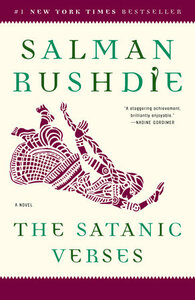Take a photo of a barcode or cover
One of my top five favorite books ever. An absolute work of genius.
Good times. Although Rushdie's "good" can be bad and "bad" can be good theme isn't completely original, it certainly plays out in a delightful way. Also, though these characters are often farcical, I really enjoyed their relationships with each other (Saladin's father, especially). It's funny, I found this book's ideas completely uncontroversial. I kept wondering what upset people so much.
As usual, when Rushdie got too satirical or too into wordplay, I was annoyed. It's a little too smug. However, I guess you get to be smug if you're Salman Rushdie.
As usual, when Rushdie got too satirical or too into wordplay, I was annoyed. It's a little too smug. However, I guess you get to be smug if you're Salman Rushdie.
So, I'm not sure what to say about this book. I think I've mentioned that I've never read any of Rushdie's work before, and had no idea going in what his writing style was like. But I got this audiobook in a humble bundle and thought I ought to give it a try.
And I liked it more than I thought I would. The structure is very non-linear, which was a little difficult for me. The magical-realism aspect was also a surprise. But those things together with a compelling story of two men on similar paths that have veered in dramatically different directions was just great.
It was confusing with all the jumping around, but I would definitely recommend it to a friend, and it makes me want to read more of Rushdie's work.
And I liked it more than I thought I would. The structure is very non-linear, which was a little difficult for me. The magical-realism aspect was also a surprise. But those things together with a compelling story of two men on similar paths that have veered in dramatically different directions was just great.
It was confusing with all the jumping around, but I would definitely recommend it to a friend, and it makes me want to read more of Rushdie's work.
The Satanic Verses is a work very much Indian and very much Islamic, a work full of history and literary allusion and about as complex as one could ask for, full of religion and myth and comic mishaps. In the large majority of situations, Rushdie’s writing lands well by paragraph and by chapter. On the whole, I found the conflict within the story disorienting, as if the reader is being intentionally discouraged by the narrator (God?) from coming to any conclusions about good v evil and reality v hallucination.
Background - With so little first hand knowledge about Islam, it helped me to know that the satanic verses is a reference to a handful of lines supposedly from Muhammad that legitimize other goddesses as demigods within the Islamic tradition. Apparently these verses were never canonized but their existence is used by Rushdie to draw a critical eye toward the question of purity of belief v taking shortcuts or making allowances to get results. The Satanic verses of Muhammad were expunged from the religion in his own lifetime by explaining that it was Satan and not the Angel Gabriel who gave him this specific revelation about these local goddesses.
The Satanic Verses follows the serendipitous and supernatural interactions of Indian actors Gibreel and Saladin, after the plane they both take from Bombay to London is hijacked and explodes over the English Channel. Gibreel is the most famous Bollywood star in India, recently experiencing strange episodic dreams that are slowly convincing him that he is the Angel Gabriel, divine spokesperson and conduit of inspiration for the Qu’ran. Saladin is the estranged son of a wealthy Indian merchant, a no nonsense Anglophile who is obsessed with British orderliness and works as a voice actor in England. Both men were once Muslim but Gibreel defiantly consumed pork when he at last rejected God and Saladin seems to have been a rational materialist since childhood. When the airplane explodes at 30,000 feet, these two men fall entwined, heads between one another knees in an almost yin-yang fashion and, in the midst of the descent, a surreal transformation begins. Gibreel takes on his angelic form and Saladin becomes his equal opposite, the personification of evil himself. Somehow, miraculously, they flap down to the surface of the ocean and survive. But when Saladin awakes, he finds the beginnings of horns sprouting on his head. And there is a glowing aura about the head of Gibreel.
What follows is a series of stories, some from the incredible intertwined lives of these men and some from the historically and religious informed dreams/transformations of Gibreel. These supernatural changes in the two men are regularly referred to as having reality in the world and effecting the people and society and weather around them, but they are also often written off as mental health issues or strange flukes. As the plot goes on, the strange events follow little coherent line I could make out, but the roles of the two men as good v. evil are regularly blurred and reestablished.
I like Rushdie’s style and his comic approach. I like the characters and the Indian perspective. I find the Islamic and Hindu elements interesting and enlightening. But the larger metaphysical and philosophical perspectives being pursued seemed really conflicted and the plot suffered from a nebulous meandering, as if coming to any conclusions about the hundreds of very distinct material and supernatural elements would somehow be eternally premature. Rushdie seems to want to say something but refuses to get to saying anything.
The second half of the book made me increasingly wonder where all this was going and the ending was satisfying in a way that seemed to sidestep all of the supernatural elements at its core.
Background - With so little first hand knowledge about Islam, it helped me to know that the satanic verses is a reference to a handful of lines supposedly from Muhammad that legitimize other goddesses as demigods within the Islamic tradition. Apparently these verses were never canonized but their existence is used by Rushdie to draw a critical eye toward the question of purity of belief v taking shortcuts or making allowances to get results. The Satanic verses of Muhammad were expunged from the religion in his own lifetime by explaining that it was Satan and not the Angel Gabriel who gave him this specific revelation about these local goddesses.
The Satanic Verses follows the serendipitous and supernatural interactions of Indian actors Gibreel and Saladin, after the plane they both take from Bombay to London is hijacked and explodes over the English Channel. Gibreel is the most famous Bollywood star in India, recently experiencing strange episodic dreams that are slowly convincing him that he is the Angel Gabriel, divine spokesperson and conduit of inspiration for the Qu’ran. Saladin is the estranged son of a wealthy Indian merchant, a no nonsense Anglophile who is obsessed with British orderliness and works as a voice actor in England. Both men were once Muslim but Gibreel defiantly consumed pork when he at last rejected God and Saladin seems to have been a rational materialist since childhood. When the airplane explodes at 30,000 feet, these two men fall entwined, heads between one another knees in an almost yin-yang fashion and, in the midst of the descent, a surreal transformation begins. Gibreel takes on his angelic form and Saladin becomes his equal opposite, the personification of evil himself. Somehow, miraculously, they flap down to the surface of the ocean and survive. But when Saladin awakes, he finds the beginnings of horns sprouting on his head. And there is a glowing aura about the head of Gibreel.
What follows is a series of stories, some from the incredible intertwined lives of these men and some from the historically and religious informed dreams/transformations of Gibreel. These supernatural changes in the two men are regularly referred to as having reality in the world and effecting the people and society and weather around them, but they are also often written off as mental health issues or strange flukes. As the plot goes on, the strange events follow little coherent line I could make out, but the roles of the two men as good v. evil are regularly blurred and reestablished.
I like Rushdie’s style and his comic approach. I like the characters and the Indian perspective. I find the Islamic and Hindu elements interesting and enlightening. But the larger metaphysical and philosophical perspectives being pursued seemed really conflicted and the plot suffered from a nebulous meandering, as if coming to any conclusions about the hundreds of very distinct material and supernatural elements would somehow be eternally premature. Rushdie seems to want to say something but refuses to get to saying anything.
The second half of the book made me increasingly wonder where all this was going and the ending was satisfying in a way that seemed to sidestep all of the supernatural elements at its core.
challenging
mysterious
reflective
medium-paced
Plot or Character Driven:
A mix
Strong character development:
Complicated
Loveable characters:
Complicated
Diverse cast of characters:
Complicated
Flaws of characters a main focus:
Yes
I only rated it low because of personal preference. I can certainly see why it’s a book within the canon. I don’t love magical realism, and I did not know many of the references, so I spent a good deal of time researching people and terms. I recommend this book, but it’s time consuming if you want to really be engaged with the style, and the references and their importance.
I really enjoyed this book, although the loose ends frustrated me a little. Despite this, I never cease to be amazed by Rushdie's writing style. I look forward to the next!
This book was a hard read because I have very little reference of Islam or the story of the prophet Mohammed to lean on. The story is difficult to follow at times, but the literary genius that is Rushdie is echoed in every crevice of the religious politicking that is The Satanic Verses. I enjoyed the descriptive writing that makes reference to books by some contemporary Indian poets and writers, which is a treat to see in New World English literature. I found the dichotomy of the two central characters to be fascinating and illuminating. It's going to take me a while after the completion of this book to truly digest the intricacies of Rushdie's running commentary on India, ethnic relations and the growing tension that sits at the base of religious practice and belief systems.






